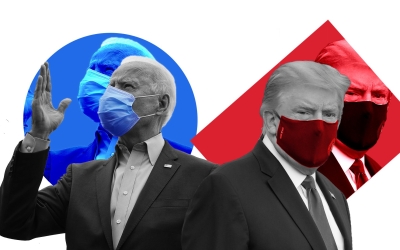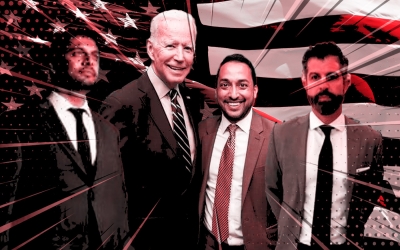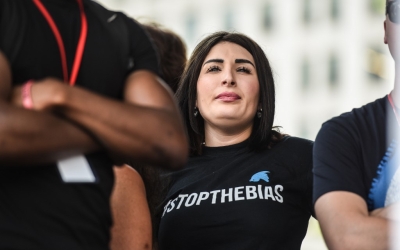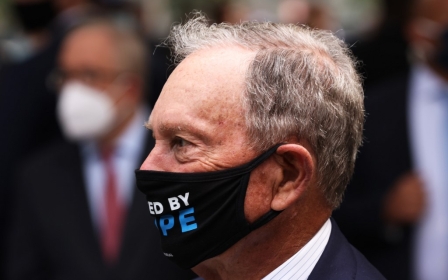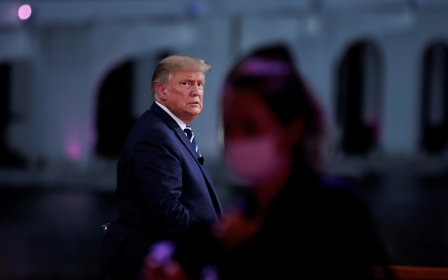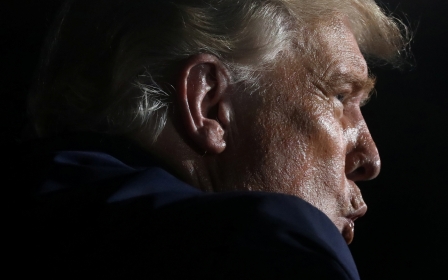'We don't have much of a choice': Florida's Muslim voters disenfranchised by both parties

As the US November elections edge closer, much of the nation's attention has zeroed in on swing states, with some, such as Florida, set to be battlegrounds that may determine the outcome.
While there are only about 3.45 million Muslims in the US - less than one percent of the population - swing states including Florida, Michigan, Pennsylvania and Wisconsin contain the Muslim community's largest concentrations, and its voting power.
In Florida, the largest of the swing states, there are about 700,000 Muslims, with 200,000 registered to vote in 2016, according to the state's Council on American-Islamic Relations (CAIR) chapter.
Now-President Donald Trump won the sunshine state by just under 113,000 votes in that election.
While the Democratic Party has spent unprecedented resources on Muslim community outreach this election cycle, the Republican Party has done little to bring in the Muslim vote, despite it being seen as a pivotal Republican demographic in George W Bush's first term win.
Bush won Florida by just 537 votes in 2000.
'We don't have much of a choice'
According to a CAIR survey, 71 percent of Muslims say they are voting for presidential nominee Joe Biden, while 18 percent said they support Trump. Another 11 percent were either undecided or preferred not to answer.
Still, many Florida Muslims belonging to both parties are less than enthusiastic about the candidates.
Nadia B Ahmad, a law professor in Orlando and a 2020 Democratic National Committee delegate for Florida, has been warning the Democratic Party over what she sees as a policy of taking the Muslim vote for granted.
"The Democratic Party in Florida will embrace Muslims generically, but it won't take up the issues important to the community. So they want Muslim votes, but they don't want Muslim voices at the table," Ahmad said.
In 2018, a Florida bill that classified certain criticisms of Israel as antisemitic passed unanimously in the state Senate, with large bipartisan support despite drawing sweeping condemnation from Muslim and free-speech advocates who said the legislation violated the Constitution.
Once an enthusiastic supporter of the Bernie Sanders campaign, Ahmad said Biden is more of the same Democratic status quo, which has at times disenfranchised Muslim voters with foreign policy moves, including the continuation of never-ending wars in the Middle East and ongoing support for Israel.
"People are starting to push aside whatever concerns they have about the vice president as a candidate and are continuing to still organise for Biden even though the party in Florida specifically does not want to engage with our community and our issues in the same way that it has with other communities," she said.
Muslims "don't have much of a choice" in this election, but are mostly voting for Biden and the rest of the Democratic ticket just to block Republican candidates, who particularly in Florida have been outright anti-Muslim at times, Ahmad said.
Because the Republican Party has largely alienated Muslim voters since 9/11, Muslim activists have said swing voters within the community are not faced with a choice between the two parties, but rather between voting or not voting.
"I think that we have to stay engaged, we really need to have Muslims vote in the upcoming election," despite feeling ignored, Ahmad said. "Because in Florida our voices have been determinative."
Flipping Florida
One of the co-founders of the Muslim Delegates and Allies Coalition, Ahmad and other Muslims across the country have been focused on getting Muslims out to vote blue.
In Florida, the group has identified three key counties - Pinellas, Seminole and Duval - all of which Trump won in 2016 by margins smaller than their Muslim voter populations.
The coalition believes that if it can flip those three counties, it could flip all of Florida.
One of the projects the group has been working on is the "50 State Voter Mobilization," which has seen groups come together to push for Muslim voter participation in each state.
On Sunday, however, the group was set to hold an "All Hands on Deck Florida" webinar event that was supposed to be sponsored by the Florida Democratic Party (FDP).
The Muslim Delegates Coalition secured 10 speakers for the event, sending the information to the FDP to create marketing materials. But the flyer sent back to the coalition was missing one organiser: Rasha Mubarak.
Mubarak, founder of Unbought Power, a grassroots community advocacy group, has been a vocal proponent against US support for Israel's occupation of Palestine.
The only overtly pro-Palestinian speaker on the line-up, Ahmad and Mubarak are convinced the FDP had tried to not include her because of her criticism of Israel. Florida has a powerful pro-Israel lobby.
The FDP did not respond to MEE's request for comment by the time of this article's publication.
Refusing to drop Mubarak from the line-up, the FDP pulled its sponsorship, but the event went forward as planned.
'People feel disenchanted'
Mubarak said she has continuously run into walls when dealing with the state's official Democratic Party during her 15 years of activism. But as a member of the Florida Young Democrats (FYD), an independent organisation that has supported her pro-Palestinian voice, she still has hope for the party's future.
Formerly the president on the FYD of Orange County and currently on the group's national committee, Mubarak said the youth group's leadership "have unequivocally stood with myself and the plight of the Palestinian people".
'I would advise our community no matter who the candidate is, that they earn our vote because a lot of times they're taking our vote, they're taking our donations, but they're not taking our voice to Tallahassee. They're not taking our voice to Congress'
- Rasha Mubarak, Democrtic activist
"Progressive spaces of advocacy groups that you would expect to be inclusive in Florida, have been leaving Palestinians out of the equation. So I am definitely proud of the Florida Young Democrats and the leadership for leaning in and truly not letting anyone waiver from their decision and standing on these issues," Mubarak said.
Nationally and at the state level, however, like Ahmad, Mubarak feels left out.
"It is exhausting and people feel disenchanted. You know, we all know that the presidential elections are important. We have a fascist in the White House, but I think also understanding local and state elections, the amendments and local policy is super important because these are also decision-makers," Mubarak said.
She stressed that the work will not be over after November and plans to keep pushing the Democratic Party to become more inclusive and make concessions for the Muslim vote.
"I would advise our community, no matter who the candidate is, that they earn our vote because a lot of times they're taking our vote, they're taking our donations, but they're not taking our voice to Tallahassee. They're not taking our voice to Congress," Mubarak said. "So ensuring that whoever the candidate may be, whether it's a Democrat or independent, make sure that they earn our vote."
Muslims for Trump
For his part, Yasir Billoo, a business and real estate lawyer in Miami, said he does not think the Democratic Party has done much at all to earn the Muslim vote and plans to vote for Trump and the rest of the Republican ticket in November's election, despite being a less than enthusiastic supporter of the president.
"In 2016, the choice was Trump or Hillary, and so my thought process was fairly simple. Hillary kept saying, 'I want to continue the policies of President Obama'. And I didn't necessarily like the present policies of President Obama," Billoo said.
Having been a Republican who voted for Obama in 2008, Billoo was shocked by the then president's drone programme, which in 2016 on average dropped three bombs every hour, 24 hours a day, mostly in Syria and Iraq, but also in Afghanistan, Libya, Yemen, Somalia and Pakistan - all Muslim-majority countries.
"That was astonishing to me," Billoo said. "That was far from whatever 'hope and change' was promised.
"I wanted something different, and so that's what brought me to Trump".
While he only rated Trump's first term a "six out of 10," he sees another four years under Trump as better than a Biden presidency, which he said would be a clear continuation of Obama's policies.
Domestically, Billoo said he is also socially and fiscally conservative and thinks that, in the long run, conservative Muslims will swing back to the Republican Party, despite the overtly anti-Muslim rhetoric being spread among right-wing candidates.
"In terms of social conservatism... there's a lot of unease about the Democratic Party's policies," Billoo said.
"The ready acceptance of gay rights, for example, is sort of a national thing now and amongst Muslim circles, when you see Ilhan Omar attending a Pride parade, that bothers a lot of people in... the more conservative part of the Muslim community."
'Democrats have left behind religious values'
Billoo said several of his Christian friends have shared similar sentiments with him, feeling like the Democratic Party has left behind religious values. While Trump has large support from white Christian voters, Jewish voters have historically voted Democrat. Before Bush's election in 2000, the Muslim vote was mostly split between parties.
"The Muslim vote for Bush and the Muslim vote [for Republicans] prior to that was largely based on social conservatism and fiscal conservatism, but all of that went out the window as soon as 9/11 happened," Billoo said.
"So I understand why the Muslim community has gravitated toward the Democrats. They've been welcomed with open arms, for the most part, even if they've been marginalised [within their party]."
When asked about candidates such as Laura Loomer, Florida's 21st Congressional House District, being backed by the state's official Republican Party despite being actively anti-Muslim, calling Islam "a cancer" in 2019, Billoo said he did not hold it against the party for trying to appease its base, but predicted that Republicans would move away from demonising Muslims in the future.
"The Republican Party will realise maybe in the next 10 years that it needs to create a broader tent and that it can no longer win with just its base, and it will realign," Billoo said.
"The Democratic Party did that. If you think about 2008 when president Obama ran, he was not willing to step out on the ledge and say he's for gay marriage. That was 2008. That was the head of the Democratic Party. Look at them now."
Middle East Eye propose une couverture et une analyse indépendantes et incomparables du Moyen-Orient, de l’Afrique du Nord et d’autres régions du monde. Pour en savoir plus sur la reprise de ce contenu et les frais qui s’appliquent, veuillez remplir ce formulaire [en anglais]. Pour en savoir plus sur MEE, cliquez ici [en anglais].


